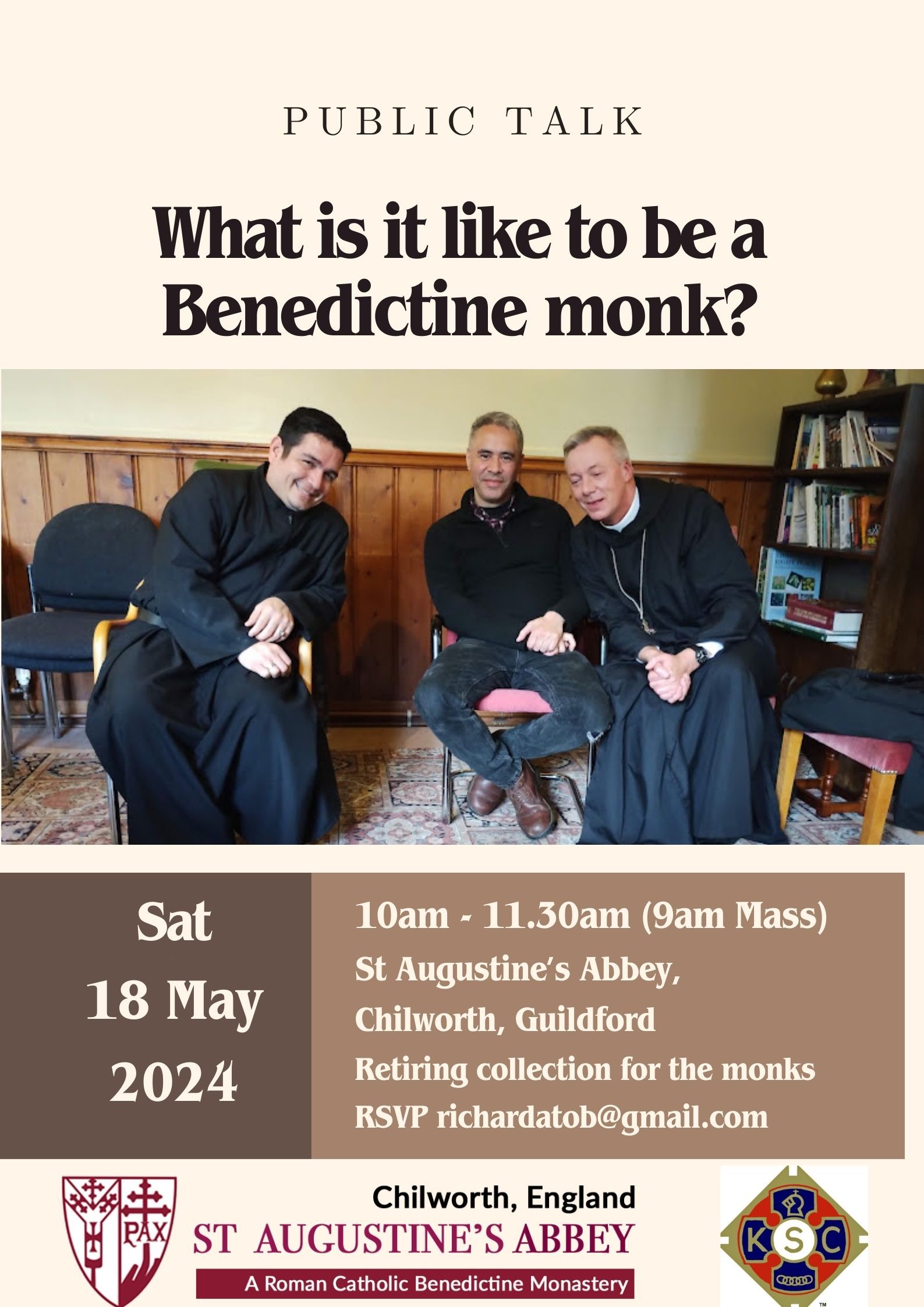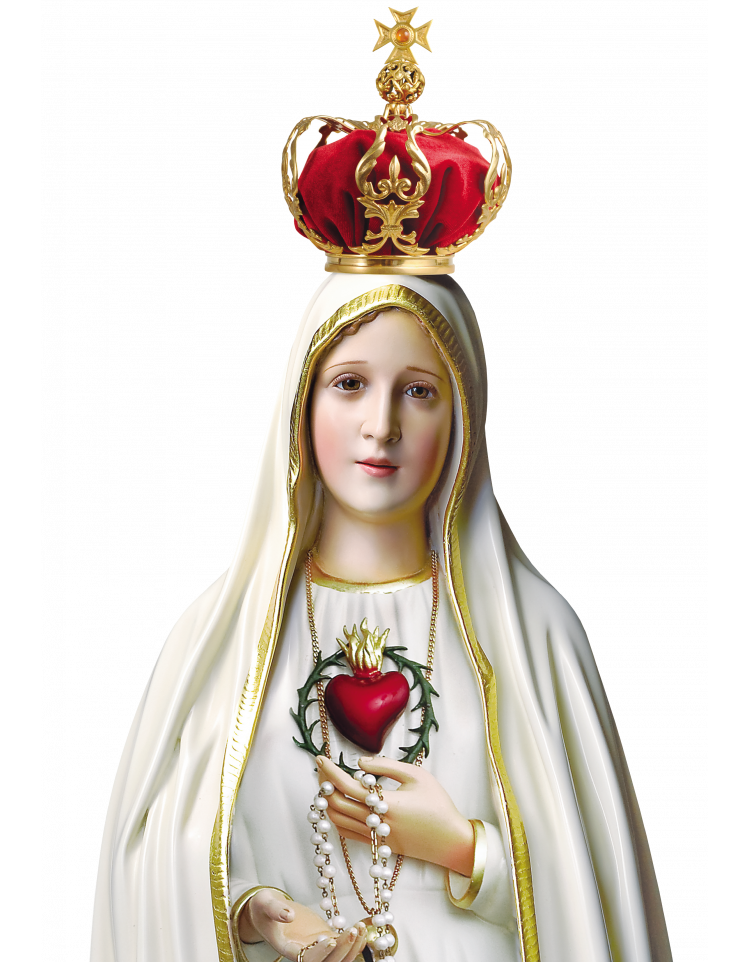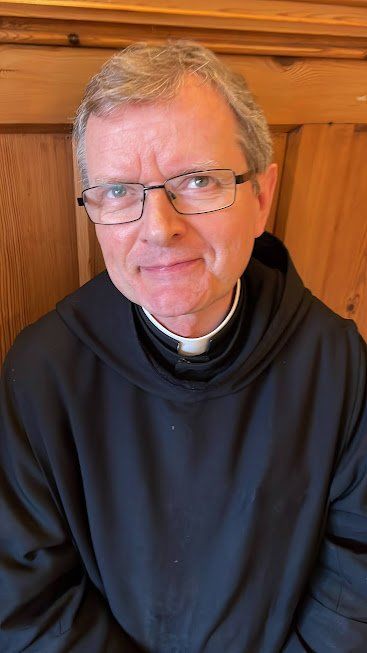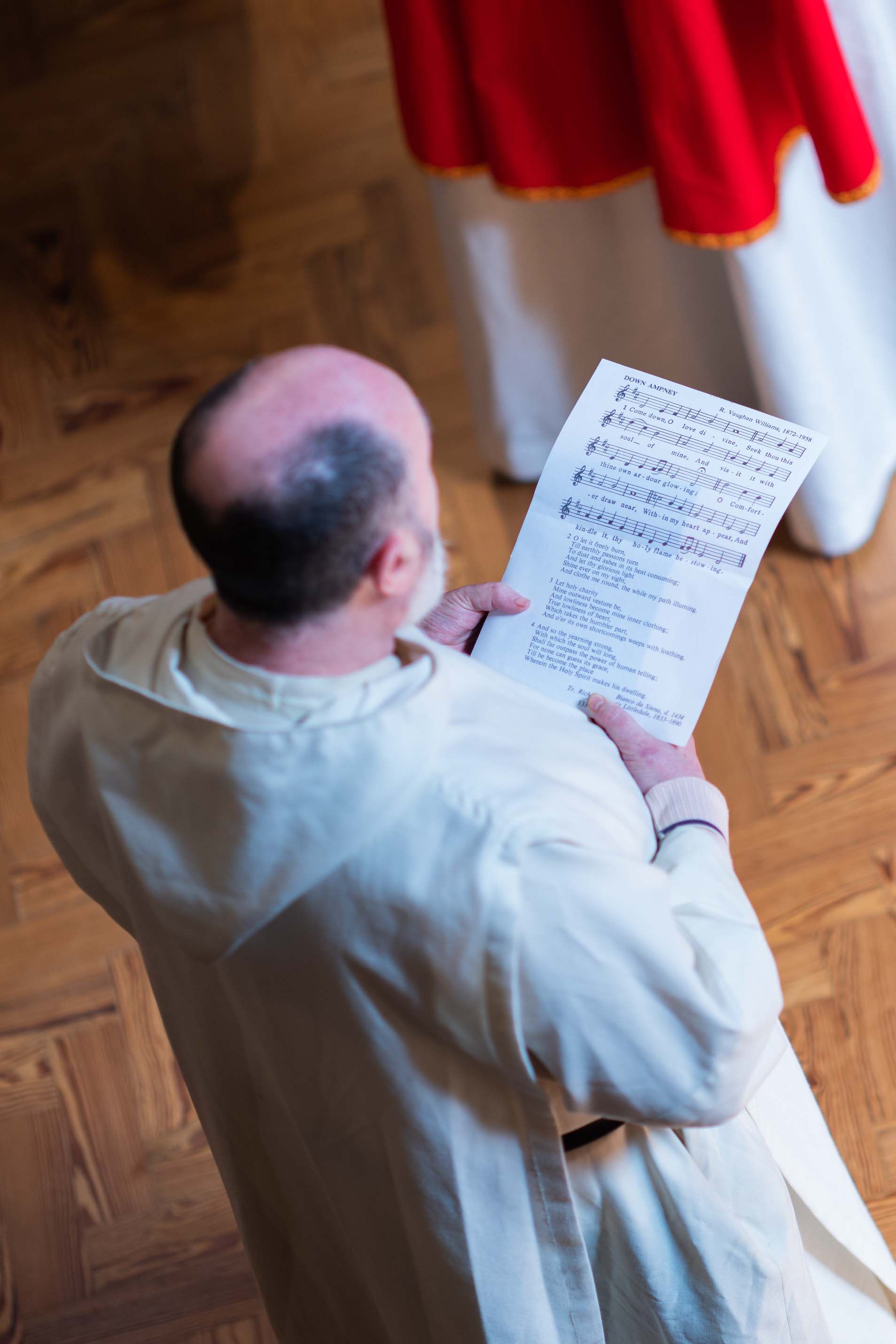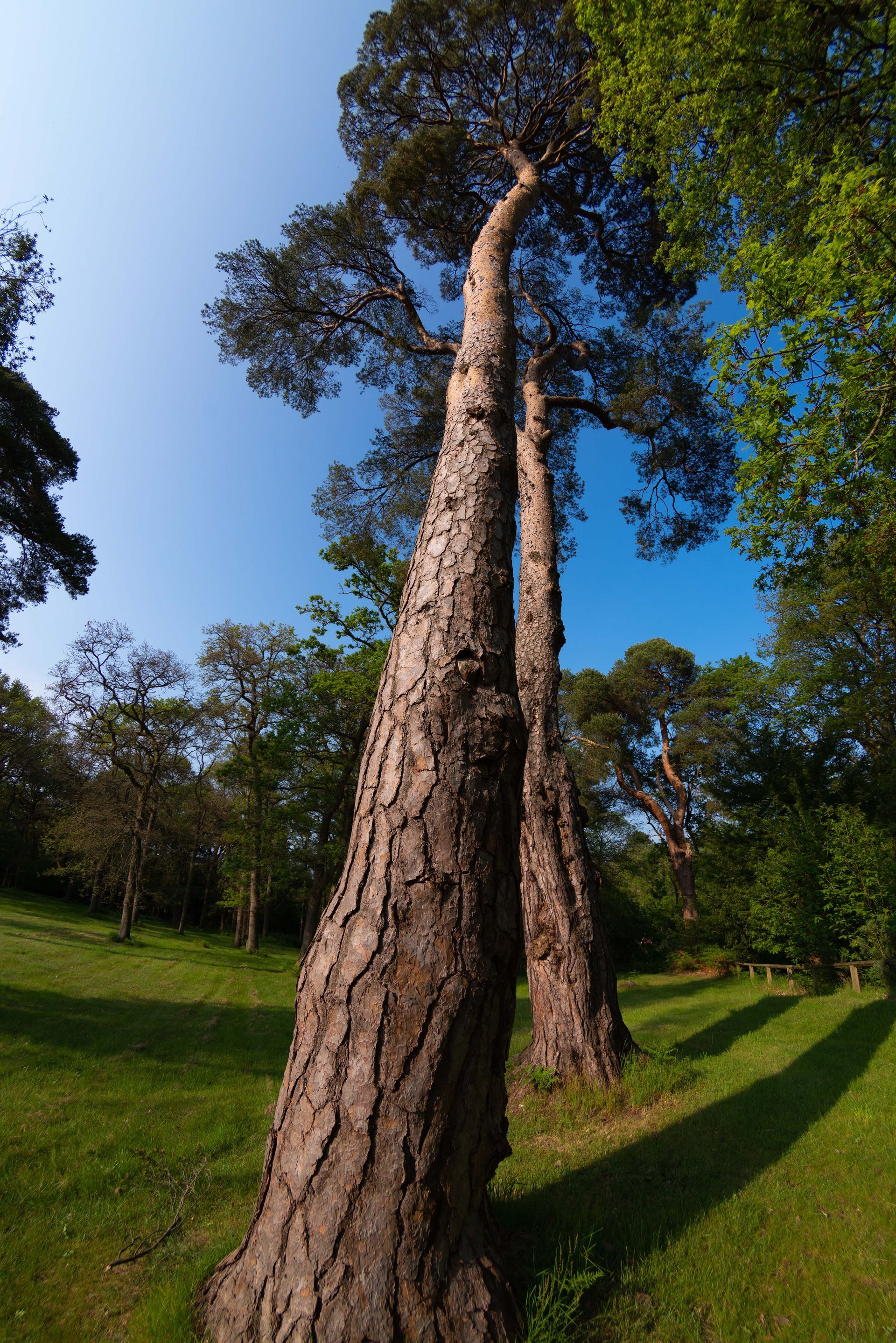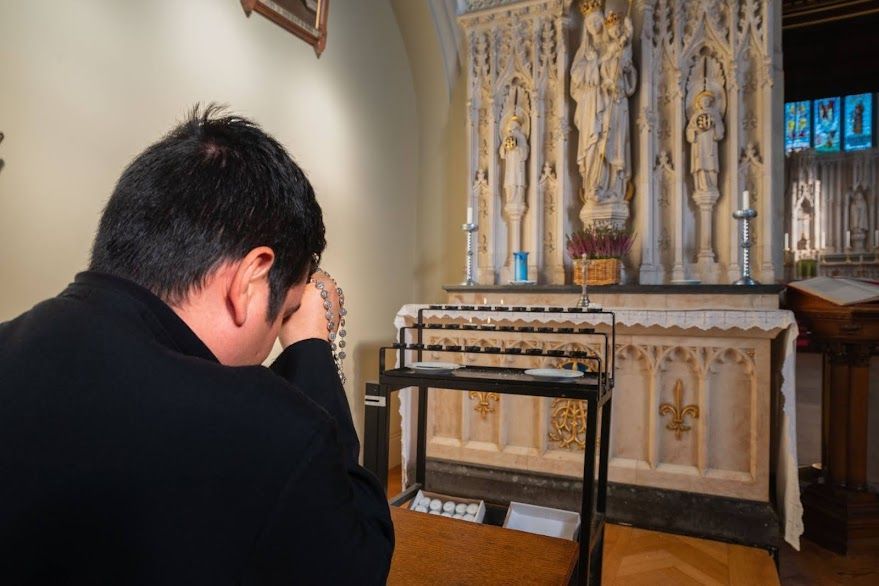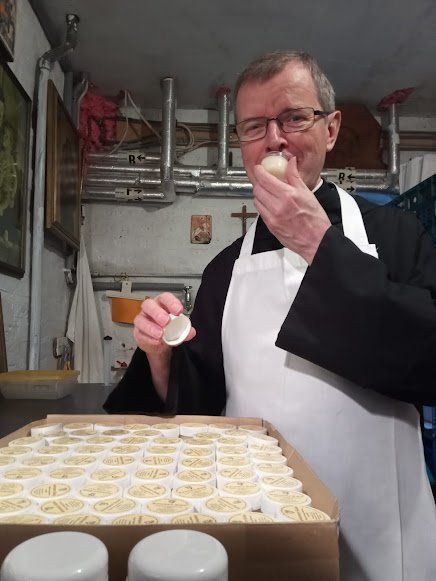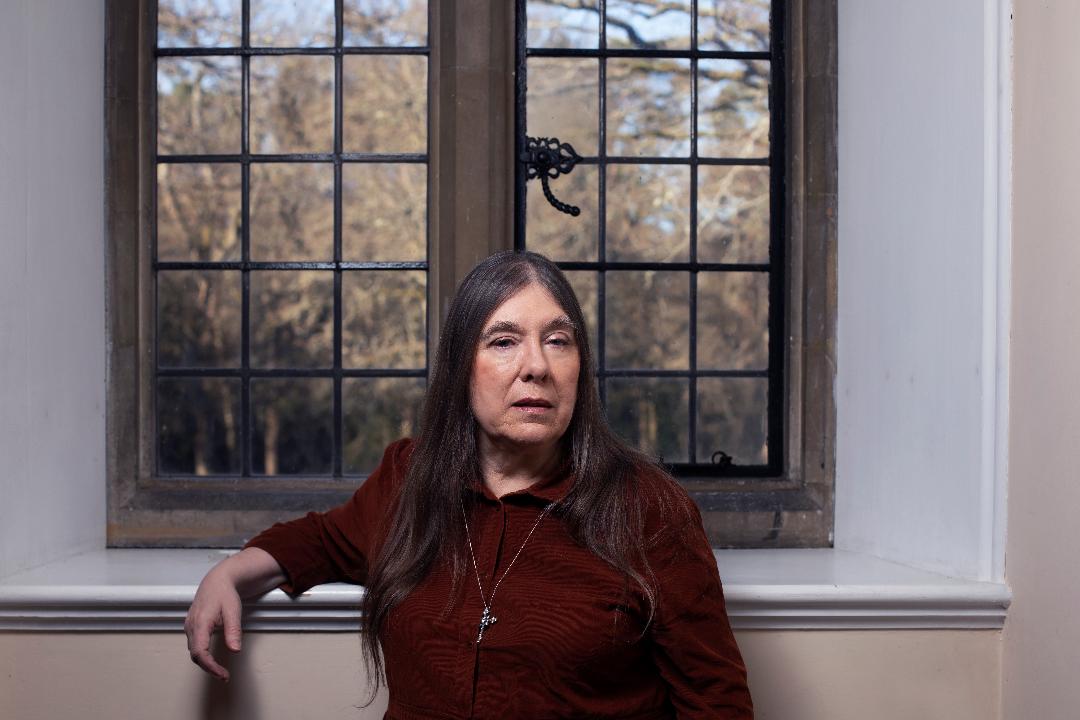Get in touch
01483 899360
Immaculate Heart of Mary - Parish
Roman Catholic Church - Huddersfield - Diocesan Trust Registered Charity : 01698423016
Monastic Forum - your questions answered
Mar 21, 2022
Common questions answered about monasticism
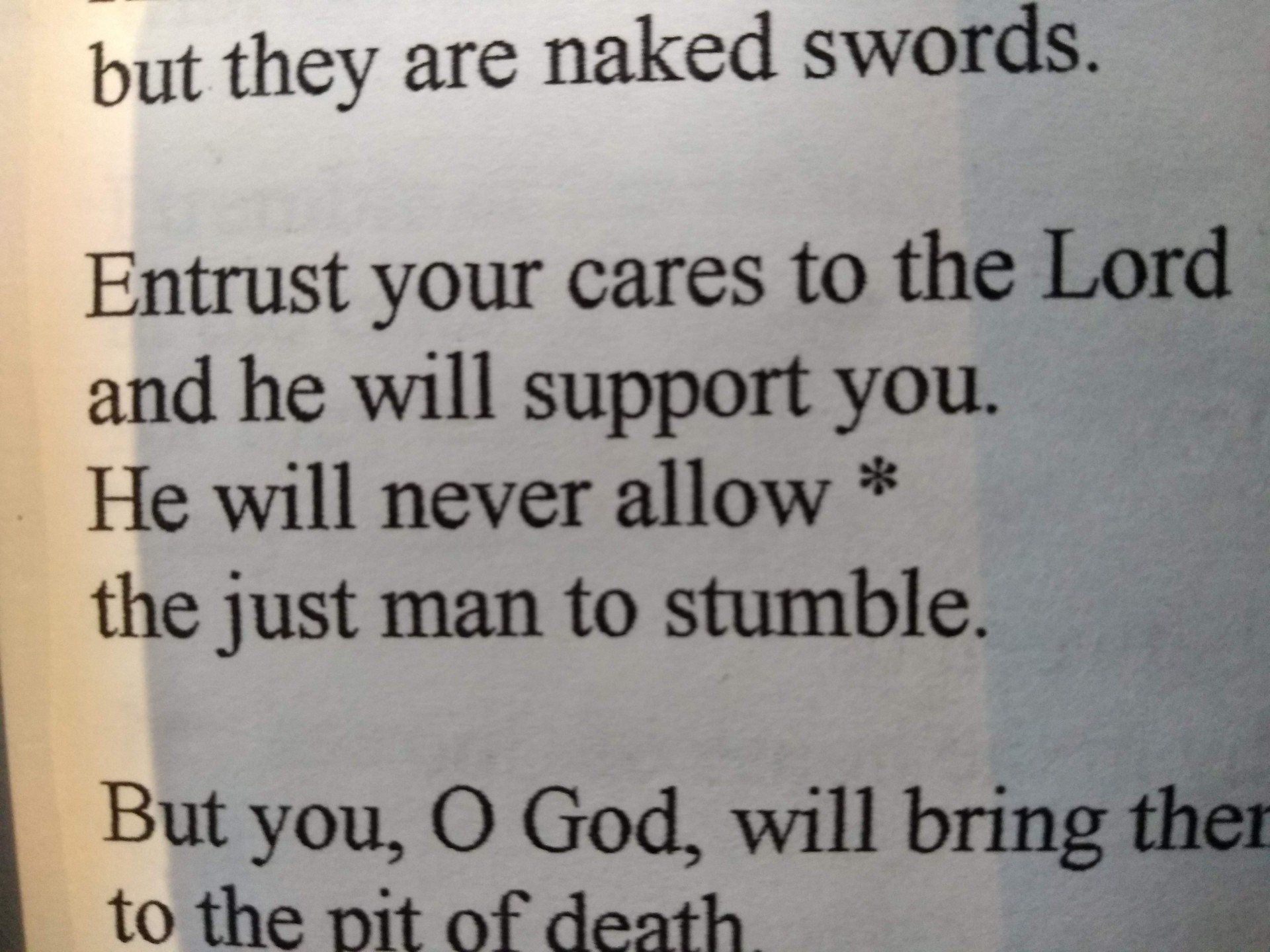
MONASTIC FORUM - for answering your questions
QUESTION 1 - 'Where do your Matins Musings' readings come from, apart from the Bible?'
As monks, the daily readings we follow, are not the ones priests read, contained in the Roman Office books, but a longer, two year cycle of readings, in a series of books called 'A Word in Season'. This gives us, as contemplative monks, a richer and more comprehensive study of scripture and a wider selection of authors who have commented on the scripture passage of the day. As you can see from our recent contributions in Matins' Musings, we are now reading the book of Judith and are enjoying understanding how God acts to 'raise up the lowly.' On 28 September 2020, we had insights from a great French 20th century theologian, Jean Danielou, who wrote an excellent book on how God acts in human events, 'The Lord of History'.
QUESTION 2 - Freedom and the monk - is being a monk like being incarcerated (a lay person asks)?
Many would perhaps see my life as lived in a voluntary prison, where freedom is non- existent.
I certainly feel free, so I began thinking why my experience of monastic life is so different from outside perceptions.
I suppose my faith in God and my desire to be united to Him forever is the key to understanding why I feel free.
I want God, and every aspect of monastic life; choral prayer seven times a day, daily Mass, study, meditation, living with and serving my brethren, all help me on the path to God, because they constantly help me to love God and my neighbour.
God gives us free will so that we can take action and be responsible for it.
In this way we shape our life. We become what we do. Good acts make us good, bad make us bad.
I believe the best good acts I can make are those which will bring me to God. A monastery offers me those in spades, therefore I not only feel free here, I am free, content and happy.
The Psalmist says to God, 'They are happy who dwell in your house, forever singing your praise'.
By Fr John Seddon OSB, Benedictine monk at St Augustine's Abbey, Chilworth, UK
QUESTION 3 - 'The Call' - what do you do when you feel GOD calling you to the monastic life?
Well, the only way ahead is to test whether the call really is from God or not. See 1 John 4:1
St Benedict implies that the idea is usually persistent, not an idea readily dismissed from your mind. When you share the idea with others and they try to dissuade you, it does not discourage you. Difficulties from your family and friends are there to test the strength of the idea of vocation!
Next, you need the courage to contact a monastery and ask to stay as a guest. The community will be assessing you as soon as they know you are seeking a possible entry but you need to assess them too. Ask yourself, 'Are these brothers going to guide me God, whom I seek?'
Do I see them living the life St Benedict wants his monks to live?
What sort of life is that?
Well, seeking God is the first criteria St Benedict establishes for someone wanting to be a monk. Not being a great preacher or teacher or singer or craftsman; these can be specialised in elsewhere, in a monastery, you seek God.
In the monastery, we are in choir together seven times a day plus Mass. You have to want to praise God from morning till night if the life is going to make you happy.
This is St Benedict's second criteria, to be keen about what he calls 'the Work of God' - frequent, daily, worship of Him. Praising God, with the brethren, using all 150 psalms every week, plus singing for Mass.
The third criteria is obedience. St Benedict believes that obedience to the Abbot is just a very useful and fast way to become holy, because Jesus followed the same path. 'I came not to do my own will but the will of Him who sent me'. The monk does the same, only to the Abbot.
The fourth criteria is being willing to do those humble chores around the house, to take one's turn cheerfully - cooking, cleaning, etc. It's basically being patient and loving in all circumstances. It's learning to put aside ego and self interest day by day and becoming humble.
Of course, you should also see them bearing charitably with each other's faults and failings, as St Benedict commands in Chapter 72, which is the jewel of his teaching. Worth reading often.
If you see them trying to do that, as best they can, in the monastery you visited, ask to speak to the Novice Master.
One last thing, read up on St Benedict and monastic spirituality, before you visit. There is masses of information online.
May God guide you to Himself.
Visit us online at www.chilworthbenedictines.com and feel free to ask questions and arrange a visit soon after Covid-19.
QUESTION 4 - On requesting a prayer by the Benedictine monks at St Augustine's Abbey, Chilworth
If you ask the monks to pray for you or your intentions (this is mostly done via our website), this is what happens:
Fr Abbot checks the website every morning for any new requests for prayer. He prints and then reads them during our daily meeting after Mass called a 'Chapter Meeting'.
All the brethren then include the requests in their personal prayer and meditation during the day.
At our evening community prayer, called 'Vespers', in the Church, the requests are again laid before God during the intercessions which conclude the prayer.
How does this prayer work?
Asking God our Father for our needs is what Jesus does now in the sanctuary of heaven. Jesus always makes intercession for us. So teaches the letter to the Hebrews. The Holy Spirit also intercedes, 'with sighs too deep for words'.
As monks, we follow this example of intercession in our own sanctuary in Chilworth, which the Father hears, as he does Jesus and the Spirit.
We believe in God's mercy. Therefore, we ask, not least because we are members of Jesus' body, the Church, spread now worldwide.
St Paul tells us to pray for others as well as ourselves, even enemies. The Church's intercessions knows no boundaries, so ask what you will!
You can also request a Mass to be said. Make a donation on the website and mention this when you make your request. It is possible to ask for Mass on a particular day, but in any case you will be told when it can be offered for your request.
QUESTION 5 - What exactly is St Augustine's Abbey, Chilworth and what does it do for the benefit of others? It seems to be a mix of traditional, evangelical and ecumenical, what does each mean?
St Augustine's Abbey, Chilworth is a place maintained specifically for those whom God calls to seek and find the love of Christ through prayer and fraternal sharing in community.
The benefit to others is the witness our life provides to the Gospel and its power to transform us into loving human beings.
Society rejects the Gospel and often lives destructively, witnessed in the failure to address ecological problems, the frequency of wars, and the every day reality of terrorism.
Monastic life, well lived, is the answer to Society's problems and shows the world how to live together in peace.
The monastery is a place of healing for the human heart, which is the source of Society's evil and deceit. Healing the heart only happens by living the Gospel together.
God is Three in One, a communion of divine persons. Jesus' prayer to his Father, for all who follow Him, the night before His Passion was, 'May they be one in us, so that the world may believe that you have sent me'.
Trying to live like this, we are evangelical.
We are also traditional in our promotion of Gregorian Chant as a way of worship which speaks deeply to the soul of Christ's love for us. We believe its subtlety and beauty draws people to God. We also celebrate Mass in the ordinary form, but turned east, so that priest and people all face the same direction, as was done from of old.
We are ecumenical in that we pray for the unity of all Christians, again so that the world may believe in the Christ whom the Father sent to the world for its salvation.
But the most effective contribution we can make to ecumenism is by living the Gospel ourselves: by 'preferring nothing to the love of Christ', so we can share His love together, which is the centre of our life, healing and growing together in Him.
QUESTION 6 - What's it like to be in love with GOD? How does it happen?
Am I 'in love' with God? The answer must be, 'No', not in the usual understanding of being 'in love'.
To be 'in love', as usually understood, for me, refers to erotic love between two people. That wonderful, tumultuous feeling that surges through you, when you meet some one and you know you must connect with him or her. It is expressed best by Shakespeare in Romeo and Juliet.
ROMEO: But soft! What light through yonder window breaks?
It is the East, and Juliet is the sun!
See how she leans her cheek upon her hand!
O that I were a glove upon that hand,
That I might touch that cheek!
Here Romeo's love, while true and sincere, concentrates on Juliet's beauty and demeanour. However, for their loves to grow and deepen together, both must transform their being in love to simply love.
So, what is love, pure and simple?
St Paul defines this love as 'patient, love is kind. It does not envy, it does not boast, it is not proud. It does not dishonour others, it is not self seeking, it is not easily angered, it keeps no record of wrongs. Love does not delight in evil but rejoices with the truth. It always protects, always trusts, always hopes, always perseveres.' 1 Corinthians 13: 4-8
If Romeo and Juliet had not died tragically young, and had been able to develop their love during their, hopefully, long lives; by bearing with each other's faults and bad habits; in patience and kindness, then their love would have become true and strong, not merely the weak, surface attraction that being 'in love' can be.
For me, God's love is as St Paul defines it. How could it be otherwise, given His endless patience and kindness with my slow progress in patience and kindness; and in all the things that He is and I am not, as yet, but I hope I make progress towards, daily.
The 'work shop', as St Benedict puts it, where this progress in love takes place is the monastery. The tools used are 'good works' done for God and my brethren.
But I can only do these 'good works' by receiving, daily God's grace, which is His Life, by reading God's Word and eating His Body and drinking His Blood daily.
In this intimate exchange of God's life and my life, I receive the knowledge that I am unconditionally loved by Him, even when I fail, trip up and make a mess of things. His love is mercy, after all.
Therefore, God's love is far more than being 'in love' with Him.
God's love is called 'agape' in Greek, and He loves, as St Paul has described for us in 1 Corinthians, in the way that we all need to be lovedmost of all: a way far beyond being 'in love'.
When does this begin or 'happen' as the questioner has put it?
When you believe in Jesus. When you accept “Jesus Christ loves you; he gave his life to save you; and now he is living at your side every day to enlighten, strengthen and free you.” as Pope Francis puts it.
This is why God's love for us is so far beyond being 'in love' with us.
Who, among all the people I have loved and have loved me, gave his or her life for me? Only Jesus.
Not only does He give His life for me, He unites Himself to my being in a way far more intimate than any two human beings can ever achieve.
In fact He is nearer to me than I am to myself, because as St Paul says. 'In him we live and move and have our being'. Acts 17:28
Nicholas Cabasilas in his Life in Christ expresses it this way, 'God's love so far surpasses any human love that the union into which he draws His lovers is beyond all human comprehension and will bear no comparison whatever.'
QUESTION 7
- What prevents someone from getting to know and love God?
First, you might ask yourself about your basic attitude towards God. 'Do I want to trust Him or to test Him?'
Trust is difficult for us all. The difficulty is that we cannot see God: He hides.
Pope Francis recently gave a very profound reason why God hides.
It is because His love for us is chaste.
This means, according to the Holy Father, 'Chastity is freedom from possessiveness in every sphere of one’s life. Only when love is chaste, is it truly love.
In contrast, when love is possessive, it becomes control.
So, God lets us go our own way, because our love for Him cannot be forced out of us, for then it would be control. But by reading this article God is already tugging at our heart, to bring us back to Himself.
Even though God hides from us, because of the chaste, nature of His love, He watches us with infinite love, not as a policeman to catch us out; but as a patient, merciful Father.
It is worth reminding ourselves of these facts constantly, to develop a trusting attitude to Him. God is all seeing, all knowing and all loving, but chaste; and therefore hidden.
But if He is all seeing and knowing, He knows and sees our past, present and future, when we can see only a tiny fraction of the present, and only from our own perspective.
The big picture is hidden from us, just as God is, but He sees it and knows it and is creating it now.
If we stay on our own, rejecting God, we have very little to guide us through life, without it ending in disaster.
So testing God, by living as if He does not exist is never a good idea.
When Adam sinned by stopping trusting God, he tried to hide from God in the garden. But God said, 'Where are you?'
Not because He he could not see Adam. The question was deeper. 'Where are you in relation to Me?'
What prevents me from getting to know God? My decision to go my own way, by myself.
In contrast, Jesus never lives alone; but absorbed in His Father's love.
QUESTION 8 I know monks are supposed to love study and learning, but can too much study be harmful to mental equilibrium?
Thank you for your question.
The solution to this question of study and whether it is harmful is simply balancing study with the other monastic activities of prayer and work. Of course, too much study is harmful to one's mental equilibrium but its useful to always keep an eye on how you are feeling mentally and then turn to working with your hands. Your mind then has a chance to absorb the latest ideas, as your hands are engaged manually.
Strangely, it is study which can be first to get pushed out of a monk's life. He has to pray and certain tasks have to be done, so it is very easy for him to say, 'I will study tomorrow'. This is bad because study feeds prayer and helps you work well at your tasks, with a mind focused on Christ.
If you balance these three aspects, your monastic life goes well. Problems arise when one aspect predominates for long periods.
QUESTION 9 What sort of Mass takes place at St Augustine's Abbey, Chilworth?
When we came to Chilworth ten years ago, we had just read in the Refectory, while we at supper, The Spirit of the Liturgy, by Joseph Ratzinger, now Pope Emeritus Benedict XVI. Some of us had been very moved by his advocacy of celebrating Mass facing East, in that book.
Visiting Chilworth for the first time, we were all overwhelmed by the beauty of the church, not least because of the spaces it provided for celebrating a worthy liturgy. It also possessed an imposing altar, intricately carved in marble, facing East.
A modern altar facing the congregation had also been installed; which it was quickly decided to give away to another group, who were in need of it.
Also, permission was quickly sought to restore the floor of the church to its original condition; by removing the platform which had supported the modern altar.
The floor was then cleaned and polished, as a result of a very generous benefactor; revealing its beautiful parquet patterning, particularly in the oak and teak on the three altar steps, which were then newly carpeted in red.
So, from the first public Mass celebrated by us at Chilworth, we faced East. This changed our practice from Ramsgate; which faced the people.
Was the reason simply aesthetic? No, most of us agreed with Pope Benedict, that priest and people should all be facing in the same direction and following the ancient practice of the Church. A tradition which powerfully shows, that because the Mass makes present the Lord; not only of history but also of the cosmos, it is appropriate that everyone faces and prays towards the place where the sun rises.
We do not, however, celebrate Mass in the Extraordinary Form, sometimes called Tridentine. Mass is in the Ordinary Form, with Introit, Alleluia, Offertory, Communion and Ordinary all sung in Latin Plainsong settings.
The Prayers and Readings are all in English.
QUESTION 10 Through the keyhole - who lives in the monastery at St Augustine's Abbey, Chilworth and what do they do every day?
We are ten monks living at St Augustine's Abbey, Chilworth.
Monastic lives are made up of three activities: prayer, study and work. As St Benedict advises in his Rule at Chapter 48 on the Daily Manual Labour.
1 Idleness is the enemy of the soul. Therefore, the brothers should have specified periods for manual labour as well as for prayerful reading. 2 We believe that the times for both may be arranged as follows: 3 From Easter to the first of October, they will spend their mornings after Prime till about the fourth hour at whatever work needs to be done. 4 From the fourth hour until the time of Sext, they will devote themselves to reading. 5 But after Sext and their meal, they may rest on their beds in complete silence; should a brother wish to read privately, let him do so, but without disturbing the others. 6 They should say None a little early, about mid-way through the eighth hour, and then until Vespers they are to return to whatever work is necessary. 7 They must not become distressed if local conditions or their poverty should force them to do the harvesting themselves. 8 When they live by the labour of their hands, as our fathers and the apostles did, then they are really monks. 9 Yet, all things are to be done with moderation on account of the fainthearted.
In terms of prayer, we gather in choir eight times a day from early morning (5.45 am) until early evening (8.45 pm). Two half hour periods of private prayer, in the morning and evening are added to this, to practise lectio divina or sacred reading. Other pages on the Website give more detail about this.
Outside prayer and reading, time will be spent doing the necessary household chores of cleaning, laundry and cooking and shopping. We all have specific duties to run the library, the guest house, the refectory, the archives, the bursar's office, preparing and selling our monastic products, composing music and texts for the prayer offices or composing talks and sermons to be delivered during Mass or study days or via Zoom. Some brethren are studying intensively in preparation for taking their monastic vows or the priesthood or take extra specialised courses to benefit themselves or the community.
By Fr John Seddon OSB, Benedictine monk at St Augustine's Abbey, Chilworth
Share
Tweet
Share
Mail
St Augustine's AbbeySample Oak LaneChilworthGuildfordSurreyGU4 8QRUnited Kingdom
Copyright 2024 © St Augustine's Abbey, Chilworth, Guildford, Surrey GU4 8QR United Kingdom. All rights reserved.
A Roman Catholic Benedictine monastery which is part of the Order of Saint Benedict (OSB) - Subiaco Cassinese Congregation.
We are located within the Roman Catholic Diocese of Arundel & Brighton.
UK registered charity number: 245415. Safeguarding. Privacy statement.
Website mechanics by:
Every Day Christian Marketing Website content by: Richard Morris





